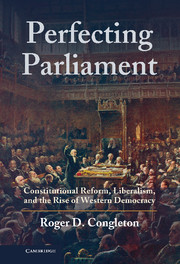Book contents
- Frontmatter
- Contents
- Preface
- 1 On the Origins of Western Democracy
- Part I Sharing Sovereignty
- Part II Historical Evidence on Western Democratic Transitions
- 9 Setting the Stage
- 10 Liberalism and Reform in the Transformative Century
- 11 Fine-Grained Constitutional Bargaining
- 12 An Overview of British Constitutional History
- 13 Constitutional Exchange in the United Kingdom
- 14 The Swedish Transition to Democracy
- 15 Constitutional Reform in the Netherlands
- 16 Germany
- 17 The Japanese Transition to Democracy and Back
- 18 The United States, an Exception or Further Illustration?
- Part III Analytical History as Social Science
- Appendix Methodological Approach, Limits, and Extensions
- References
- Index
13 - Constitutional Exchange in the United Kingdom
Published online by Cambridge University Press: 05 June 2012
- Frontmatter
- Contents
- Preface
- 1 On the Origins of Western Democracy
- Part I Sharing Sovereignty
- Part II Historical Evidence on Western Democratic Transitions
- 9 Setting the Stage
- 10 Liberalism and Reform in the Transformative Century
- 11 Fine-Grained Constitutional Bargaining
- 12 An Overview of British Constitutional History
- 13 Constitutional Exchange in the United Kingdom
- 14 The Swedish Transition to Democracy
- 15 Constitutional Reform in the Netherlands
- 16 Germany
- 17 The Japanese Transition to Democracy and Back
- 18 The United States, an Exception or Further Illustration?
- Part III Analytical History as Social Science
- Appendix Methodological Approach, Limits, and Extensions
- References
- Index
Summary
CONSTITUTIONAL EXCHANGES AND THE GLORIOUS REVOLUTION: WILLIAM III AND THE PARLIAMENT
From an early age, William (Willem) III had been educated in the fields most useful for a future stadhouder: in military matters and strategies for negotiating with a sovereign republican government (Claydon 2002, 15). During his adult life, William had become very good at building support within the provincial governments and in the States General. This was necessary in the context of the Dutch constitution (see Chapter Fifteen) because the provinces – rather than the stadhouder – were sovereign and had veto power over both budgets and legislation. The office of stadhouder was normally combined with that of captain general, which made the stadhouder responsible for the army and one of the most influential persons in the Netherlands.
By the time that stadhouder Willem III became William III, King of England, he was a middle-aged man with substantial experience in military leadership and in bargaining with parliament. He was not, as kings of England tended to be, long destined to the throne and used to royal deference throughout his life, although he belonged to a very distinguished and powerful Dutch family and was married to the daughter of James II. As stadhouder, William III was used to dealing with several parliaments to obtain funds for his executive responsibilities, especially for national defense, as national security was the primary charge of the Dutch stadhouders (Claydon 2002, 25).
- Type
- Chapter
- Information
- Perfecting ParliamentConstitutional Reform, Liberalism, and the Rise of Western Democracy, pp. 327 - 367Publisher: Cambridge University PressPrint publication year: 2010



